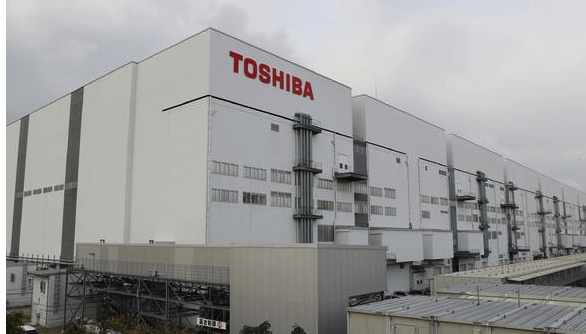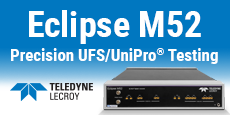Toshiba NAND Chip Business for Sale, but What About HDDs and SSDs?
Could Western Digital acquire total package?
By Jean Jacques Maleval | April 21, 2017 at 2:55 pm142-year old electronics conglomerate Toshiba is in big financial trouble with operating loss of ¥573 billion for global revenue of ¥3,847 billion revenue down 167% Y/Y for the nine months ended last December. Main reason was the ugly situation of subsidiary Westinghouse Electric company (nuclear power unit) in bankruptcy.
To get money to survive, the company has decided to sell a jewel, its NAND chip business, and is aiming to complete the operation by March 2018 to raise much-needed cash.
There are only half a dozen of NAND chips manufacturers in the world as this business involves enormous investments to build fab:
• Intel/Micron in Lehi, UT, Manassas, VA and Singapore (IMS)
• Samsung in Austin, TX, China and Korea
• Toshiba/WD in Japan
• SK Hynix in China and Korea
• Powerchip in Taiwan
DRAMeXchange estimates that revenue ranking of branded NAND flash suppliers in 4Q16 was $12 billion with the following ranking:
1. Samsung (37% market share)
2. Toshiba (18%)
3. Western Digital/SanDisk (18%)
4. Micron (11%)
5. SK Hynix (10%)
6. Intel (7%)
Toshiba chip fabrication facility in Yokkaichi, Japan

According to different sources, potential bidders are Apple with Foxconn, Broadcom, Google, Hon Hai Precision Industry Co, Innovation Network Corp. with KKR & Co., Micron, SK Hynix, Tsinghua Group and Western Digital.
Apple is probably the biggest client of these chips in the world for its smartphones and computers as the company decided few years ago to stop to offer HDDs and to integrate SSDs only. If it produces its own chips via Toshiba’s acquisition – with the help of Chinese iPhone subcontractor manufacturer Foxconn – and not from outsourced firms like Samsung, it will get them at better prices
For SK Hynix or Micron, getting Toshiba business will help them to reach the second position in the market.
Broadcom in Singapore is an avid acquirer of companies (Brocade, Cirrus Logic storage portfolio), Gadzook, LSI, NetLogic, RAIDcore, Siliquent Technologies, Sunext Design these past years) and could enter in flash chip manufacturing. It may consider joining with private equity investor Silver Lake on a bid of $23 million.
We will be surprise to see Chinese firm Tsinghua Unigroup being able to realize such a big acquisition.
Google has the money to do it but we don’t see flash chips being really complementary to its business.
Hon Hai is a Taiwan-based main assembler for Apple and is considering a bid with Sharp for about $27 billion.
State-backed turnaround fund Innovation Network Corp. of Japan is also considering investing in the memory chip company.
The last one is number one HDD maker Western Digital, already in flash chips following its acquisition of SanDisk. WD could get Toshiba activity for the better price ($16 billion?) – probably with the help of some Japanese banks to reassure the Japanese government – because its has a strong agreement with Toshiba concerning IP and their common chip plant in Japan. WD recently said that Toshiba breaching contract and wanted exclusive chip talks and looks to operate a veto over this flash deal. All other potential acquirers will be embarrassed by this partnership. But the company may not be able to dish out more cash so soon after SanDisk’s acquisition.
Nobody spoke about another potential acquirer: Seagate. This company fails to acquire SanDisk and could regain credibility with the acquisition of Toshiba chip business. But il will be more than the price paid by WD ($16 billion), something between $18 billion and $28 billion, and Seagate seems reluctant to spend so much money, being more inclined to protect its shareholders than to assure the long-term future of the company.
But beyond this huge acquisition remain a big questions: what will be the destiny of Toshiba HDD and SSD businesses?
Up to now, nothing was revealed by the Japanese firm. So here is our own opinion.
Toshiba is not a leader in HDD or SSD but with recent significant growth in these two fields.
Toshiba shipped 24 million HDDs in 1Q17 corresponding to a 24% worldwide market share, according to Trendfocus. For IDC, in this $25 billion segment in 2016, Toshiba’s unit market share increased by 9% in 4Q16, reaching a total market share of 24%.
For SSDs, IDC estimated that company’s SSD revenue grew 114% year over year in 2016, getting the fourth place in total market share. Trendfocus calculates that the Japanese manufacturer got a 7.6% market share in units shipped and 8.2% in revenue in 4Q16 corresponding to the number four ranking in both categories.
Toshiba SSD activity is worthless without its NAND chip manufacturing. An acquirer could only benefit of a portfolio of clients and a good controller technology following the acquisition of OCZ Technology in 2013 for $35 million.
Which company could buy Toshiba’s HDDs? Remember that Toshiba bought Fujitsu HDD in 2009 for 345 million. We don’t see anyone entering into the decreasing HDD market and trying to compete with much bigger competitors Seagate and WD. So these two firms are the only one that could get their hand on this business. But why they will pay even one dollar for that? If Toshiba stops HDD manufacturing, all of its customers will go directly to the two other ones, being obliged to get their disk drives somewhere. Furthermore, Seagate and WD risk antitrust reviews by several countries, in particular the Chinese government that asks for a lot of conditions to accept the former mergers between WD and HGST on one side, Seagate and Samsung HDD on the other side. With only two HDD makers remaining on the market, OEMs will not be happy at all and prices of drives will have a good chance to increase with such a tiny competition.
WD is in the best position to get Toshiba NAND chip business and why not to imagine the US firm looking for a complete package with the addition of Toshiba HDD and SSD businesses?












 Subscribe to our free daily newsletter
Subscribe to our free daily newsletter


